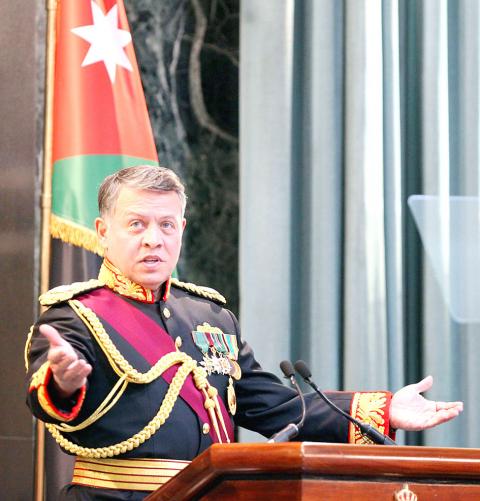Jordan’s King Abdullah II inaugurated a new parliament on Sunday with a call for accelerating reforms that have stagnated in the face of conservative tribal opposition.
For the first time publicly, Abdullah admitted that the government’s relationship with the previous legislature “suffered from numerous shortcomings that hindered our reform efforts.”
“A strong parliament that exercises its constitutional responsibilities in legislation and monitoring is essential for the realization of our vision for our people,” Abdullah told the newly elected 120-seat Chamber of Deputies.

PHOTO: AFP
Abdullah, who enjoys significant powers, dissolved the previous legislature halfway through its four-year term last year amid complaints that its predominantly conservative tribal lawmakers blocked legislation necessary to advance women’s rights and adopt policies for an open-market economy.
The king arrived to a lavish military ceremony outside the domed parliament chamber in the heart of Amman. Abdullah, who also holds the title of the supreme commander of the armed forces, inspected an honor guard as 21 guns boomed in a traditional salute.
The Chamber of Deputies met jointly with the 60-member, royally appointed Senate to hear Abdullah outline his policy.
Abdullah said that economic reform would continue to “top our -priorities” as Jordan faces “enormous” economic challenges, partly caused by the global recession.
He said the difficulties include a record budget deficit of US$2.1 billion and high unemployment and poverty.
“Political, economic, social and administrative reforms are interconnected,” he said. “We have emphasized, therefore, that economic reform should be accompanied by political reform that increases public participation in the decision-making process.”
As a start, he asked lawmakers to amend a controversial election law, which prompted Islamist opposition to boycott the Nov. 9 polls on grounds that the bill devalued votes in areas where they had most support.
The government has been hesitant to change the law, fearing Islamists would regain a majority in parliament, as happened in 1989.
Abdullah also urged a stronger role for the media, women, youth and political parties.
He said administrative and judicial reforms were needed to combat nepotism, corruption and bureaucracy. He also recommended legislation to encourage decentralization.
Later, parliament picked deputy Faisal Fayez as speaker. A former prime minister who hails from a prominent tribal Bedouin family known for its support for the king, Fayez ran uncontested for the speakership.

PRECARIOUS RELATIONS: Commentators in Saudi Arabia accuse the UAE of growing too bold, backing forces at odds with Saudi interests in various conflicts A Saudi Arabian media campaign targeting the United Arab Emirates (UAE) has deepened the Gulf’s worst row in years, stoking fears of a damaging fall-out in the financial heart of the Middle East. Fiery accusations of rights abuses and betrayal have circulated for weeks in state-run and social media after a brief conflict in Yemen, where Saudi airstrikes quelled an offensive by UAE-backed separatists. The United Arab Emirates is “investing in chaos and supporting secessionists” from Libya to Yemen and the Horn of Africa, Saudi Arabia’s al-Ekhbariya TV charged in a report this week. Such invective has been unheard of

US President Donald Trump on Saturday warned Canada that if it concludes a trade deal with China, he would impose a 100 percent tariff on all goods coming over the border. Relations between the US and its northern neighbor have been rocky since Trump returned to the White House a year ago, with spats over trade and Canadian Prime Minister Mark Carney decrying a “rupture” in the US-led global order. During a visit to Beijing earlier this month, Carney hailed a “new strategic partnership” with China that resulted in a “preliminary, but landmark trade agreement” to reduce tariffs — but

SCAM CLAMPDOWN: About 130 South Korean scam suspects have been sent home since October last year, and 60 more are still waiting for repatriation Dozens of South Koreans allegedly involved in online scams in Cambodia were yesterday returned to South Korea to face investigations in what was the largest group repatriation of Korean criminal suspects from abroad. The 73 South Korean suspects allegedly scammed fellow Koreans out of 48.6 billion won (US$33 million), South Korea said. Upon arrival in South Korea’s Incheon International Airport aboard a chartered plane, the suspects — 65 men and eight women — were sent to police stations. Local TV footage showed the suspects, in handcuffs and wearing masks, being escorted by police officers and boarding buses. They were among about 260 South

Chinese President Xi Jinping’s (習近平) purge of his most senior general is driven by his effort to both secure “total control” of his military and root out corruption, US Ambassador to China David Perdue said told Bloomberg Television yesterday. The probe into Zhang Youxia (張又俠), Xi’s second-in-command, announced over the weekend, is a “major development,” Perdue said, citing the family connections the vice chair of China’s apex military commission has with Xi. Chinese authorities said Zhang was being investigated for suspected serious discipline and law violations, without disclosing further details. “I take him at his word that there’s a corruption effort under